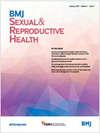Reproductive Health and Family Planning Services in Africa: Looking beyond Individual and Household Factors
Q Medicine
Journal of Family Planning and Reproductive Health Care
Pub Date : 2020-06-08
DOI:10.5772/intechopen.92138
引用次数: 1
Abstract
Worldwide, there have been remarkable gains in the provision and utilization of reproductive health and FP services. However, in Africa, despite increasing availability, utilization of these services is less than 50%, even though there are wide variations among and within the countries across the continent. Articles from peer-reviewed journals, technical reports, Internet articles, grey literature (official government documents, technical reports, etc.) and Demographic and Health Survey (DHS) reports were used as resource materials. Manual search of reference list of selected articles was done for further relevant materials. We also used for comparative analysis, the online StatCompiler tool (https://www.statcompiler.com/en/) to extract data. Reproductive health and contraceptives have a lot of benefits to the individual, family and community. However, despite near universal knowledge and availability of reproductive health and FP services in Africa, utilization of these services is less than optimal. Several factors operating at individual, household and within the community influence utilization of services. These factors are the cause of poor maternal health and care that might hinder population health and the attainment of Sustainable Development Goals (SDGs). Interventions to promote and sustain utilization of services should target these factors at different levels depending upon relative role/s of these factors.非洲的生殖健康和计划生育服务:超越个人和家庭因素
全世界在提供和利用生殖健康和计划生育服务方面取得了显著进展。然而,在非洲,尽管这些服务的可用性不断增加,但利用率不到50%,尽管非洲大陆各国之间和各国内部存在很大差异。来自同行评议期刊、技术报告、互联网文章、灰色文献(官方政府文件、技术报告等)和人口与健康调查(DHS)报告的文章被用作资源材料。人工检索所选文章的参考书目,以获取更多相关资料。我们还使用了用于比较分析的在线StatCompiler工具(https://www.statcompiler.com/en/)来提取数据。生殖健康和避孕药具对个人、家庭和社区都有很多好处。然而,尽管非洲几乎普及了生殖健康和计划生育服务的知识和可得性,但对这些服务的利用却不是最佳的。在个人、家庭和社区内运作的几个因素影响到服务的利用。这些因素是孕产妇保健和护理不良的原因,可能会阻碍人口健康和实现可持续发展目标。促进和维持服务利用的干预措施应根据这些因素的相对作用在不同程度上针对这些因素。
本文章由计算机程序翻译,如有差异,请以英文原文为准。
求助全文
约1分钟内获得全文
求助全文
来源期刊

Journal of Family Planning and Reproductive Health Care
OBSTETRICS & GYNECOLOGY-
CiteScore
0.84
自引率
0.00%
发文量
0
审稿时长
>12 weeks
期刊介绍:
The trading of Professional, Managerial & Healthcare Publications Ltd has been transferred to its parent company, Keyways Publishing Ltd.
 求助内容:
求助内容: 应助结果提醒方式:
应助结果提醒方式:


